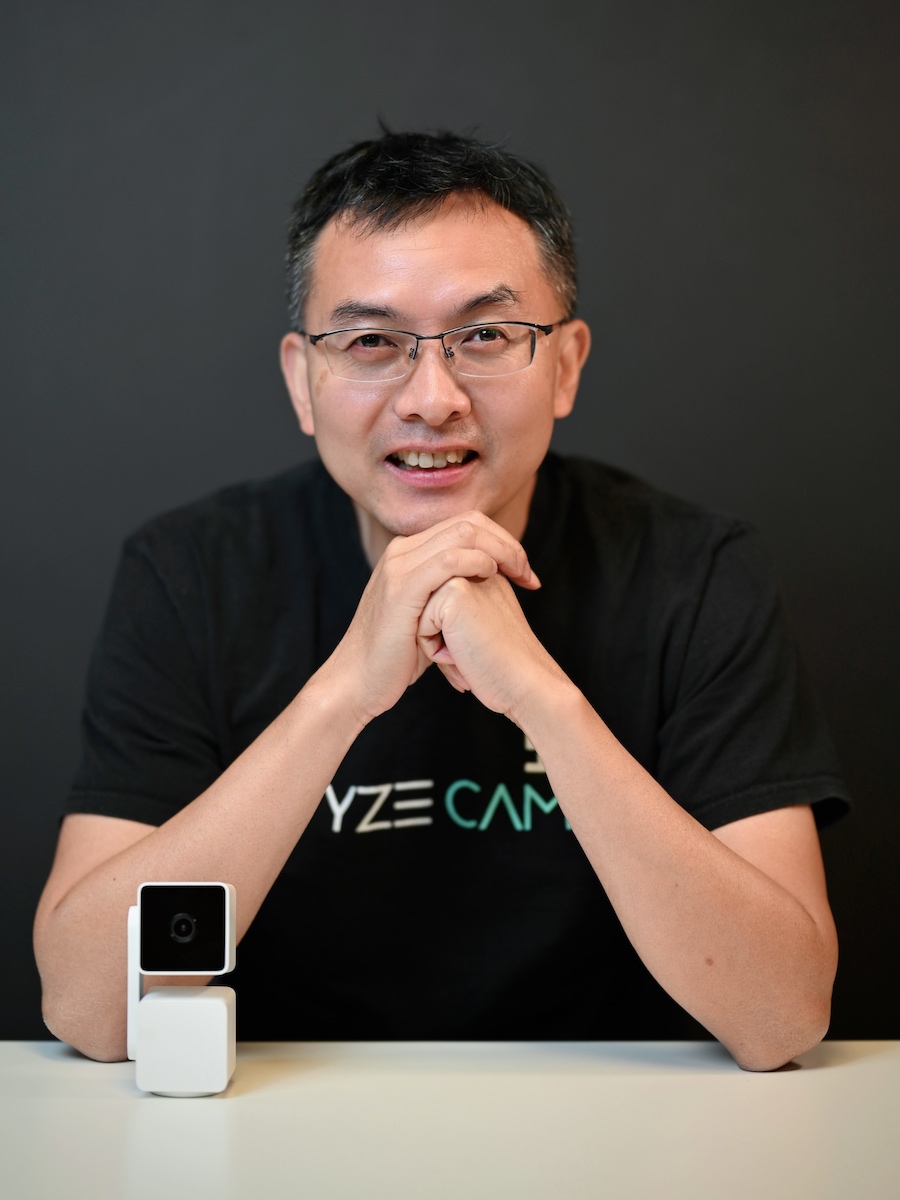Amy Sprague
April 19, 2024
We spoke with ISE alum Yun Zhang (ISE ‘06), co-founder and CEO of Wyze Labs and a member of our Executive Advisory Board. Zhang charted his path from ISE to Wyze and has some advice for students as they enter what he considers to be a really exciting market for industrial and systems engineering.

Wyze CEO and ISE alum Yun Zhang with the Wyze camera.
Your $20 home security camera has been hailed as a game-changer in the home security space. Could you introduce us to Wyze Labs?
Wyze is a consumer technology company. We make consumer smart home products and digital subscription services. We build home information and home monitoring. We deliver the devices and the digital subscription for people to manage with our app. Today, we’re in 10 million consumer households in North America after building the company for seven years now.
Our mission is to make great technology accessible to everyone. This means delivering usability and affordability.
Could you share how your ISE education and early career positions influenced your approach to leading Wyze Labs?
I joined the ISE master’s program in the fall of 2005. I had a background in mechanical engineering, but I really had a “Wow!” moment realizing the ISE toolkit could help me engineer the complicated business environment by viewing it as an integrated system of people, processes and information working together. I learned we could model and measure this system using tools from operations research, statistics, lean manufacturing, quality control and more.
After graduating, I spent three years in industrial manufacturing as a production planner, applying lean manufacturing principles before joining Amazon for three years in an e-commerce role. These experiences, combined with my ISE education, gave me the confidence that even highly complex business environments can be systematically understood and improved using an engineering mindset.
What ISE taught me was how to solve a systematic complicated problem. The problem could be targeted like fixing a manufacturing line. But now as I am a co-owner and COO of a fast-building organization, the ISE toolbox has become even more valuable because I am solving problems across an organization. I have to use a systematic approach to dive deep, set goals, and figure out what to measure.
So ISE gave me the theory and toolbox to model and improve complicated systems, whether a factory or business organization. And Amazon taught me incredibly important customer-centric leadership principles. Both of these influences helped me build Wyze Labs from the ground up.
Could you talk about the challenges and opportunities you encountered in developing and marketing such affordable yet high-quality products?
The first challenge was goal-setting. We need to set a goal that is inspirational but realistic and creates alignment between our consumers, our employees, and our shareholders.
A second challenge was having a forward-looking, yet pragmatic, mindset about what's possible. I’m reminded that UW has the slogan “Be Boundless” and that really applies. We needed to be visionary about what could be achieved tomorrow while building a viable strategy to get there step-by-step, even if the end point isn't visible or possible today. In ISE, we played a video game about cash flow. That was the first time I really learned the importance of cash flow and that it’s super important to make sure we have a viable path and strategy to grow the company.
Lastly, to make our product super affordable while maintaining high quality, we had to re-engineer everything to get rid of waste. We questioned every process and designed from first principles. We re-engineered mercilessly and applied lean concepts to drive out inefficiency.
So thinking about “Being Boundless,” where do you see Wyze going? What do you think is point B?
Seven years ago, it was about IoT, connectivity, the cloud, mobile applications. We focused on our users managing our devices through the Wyze App on their mobile devices connected to the cloud. So we spent a lot of technology and product development on that. The future, however, is shifting to AI and augmented reality (AR) as the user interfaces. AI, AR, and IoT will merge to create a customized user experience blending the digital and physical world.
You are a member of our Executive Advisory Board now. How do you see ISE changing from your time here as a student to what you are seeing now?
ISE used to be about manufacturing and supply chains, but the world is changing. We are putting more research into areas such as data science and AI and Machine Learning. These are new things that didn’t exist when I started at ISE. But ISE is adaptive to the world. The toolbox that ISE is building is getting more and more advanced for students to be the leaders in this AI era. ISE students will feel more ready and confident to enter the workforce.
What advice do you have for our ISE students as they enter the workforce?
This is a golden time for ISE students to “be boundless” to create impact because we're entering the AI era with new technologies and productivity possibilities. The world is waiting for these students with the right skills and opportunity in front of them for constructive innovation.
Be visionary! Be strategic! Have the confidence that ISE's toolbox can solve the most complicated organizational problems by taking a systematic approach. This is an era of disruptive innovation, and ISE students are perfectly positioned to drive it. Aim high! Students can use ISE's systematic thinking to run an entire organization as a CEO. With the toolbox of operations research, data science, AI, and machine learning that ISE provides, students will be well-prepared to lead in this new era!